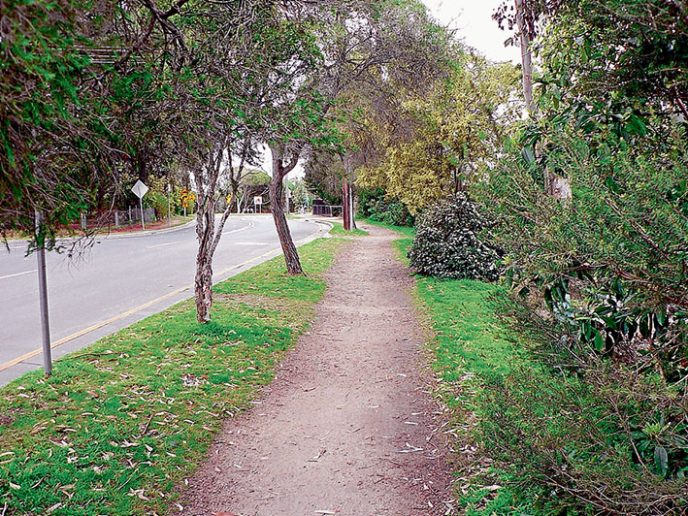SOMERS residents are celebrating their win against Mornington Peninsula Shire’s plan to make property owners pay for more than five kilometres of concrete paths through their town.
The landmark decision by the Victorian Civil and Administrative Tribunal (VCAT) may have far reaching effects for the shire and any plans it has to build new concrete paths on the peninsula.
There were tears of joy and relief from opponents of the plan when VCAT declared late Thursday that the shire’s special charge scheme was “invalid”.
Michelle Gregory saw the decision as a “resounding victory for democracy at the local level and proof that the little people have a voice if they put their minds and efforts into it”.
“Somers people have realised that they have to fight for the protection and preservation of our precious coastal village,” she said.
Infrastructure strategy manager Davey Smith said the shire “acknowledges the ruling handed down by the Victorian Civil and Administrative Tribunal. Council will review the ruling before considering any further action on the matter”.
Cr David Gill said it was “pleasing to see local democracy is alive and kicking in Somers, where a community went up against town hall and made a difference”.
Cr Gill, elected to Red Hill ward in October, said that despite the win against the shire, he had “concerns about other aspects of our local democracy, especially about the role of councillors in being allowed to represent their community”.
Three groups of 325 residents began their David and Goliath-style battle earlier this year after the shire notified 1245 property owners who received a “special benefit” from the path they must pay between $428 and $1712 to fund half the cost.
Lawyer, Somers resident and advocate for two of the three groups opposing the scheme, Chris Atmore, said she believed the win was a “first” in Victoria for residents fighting council-imposed special charge schemes.
“This will be talked about for a long time, it’s a great example of a small community showing that what they want is important,” she said.
“We, the community, have shown that we love Somers just the way it is, and we don’t want concrete paths that don’t belong here.”
At the October hearing, Dr Atmore told the tribunal the footpaths as planned by the shire “will destroy vegetation, compromise habitat for wildlife including koalas, and will detract from the character and amenity of Somers”.
However, the tribunal’s decision was based on the shire’s failure to provide adequate details of the proposal in a public notice.
The issue had effectively divided the Somers township, with some residents wanting the council to build 5.5 kilometres of concrete paths to improve access around the town; others insisted that the concrete paths were not in keeping with the coastal environment.
The fight grew increasingly bitter throughout the year, with opponents accusing the shire of a lack of transparency, claims that residents were not surveyed properly and suspicion that the council had shown favouritism to a residents’ group which supported the scheme, and at one stage even referenced the group’s survey in its justification for the scheme.
The high legal cost of taking the protest to VCAT was a major stumbling block for opponents, who were almost forced to abandon their fight when the estimated fees for the four-day hearing more than doubled and an application for a fee waiver was denied.
Dr Atmore said she was “extremely grateful” for the donations from people around Victoria that enabled all three groups to raise the $3135.60 each to proceed.
Another resident, Pam Bannister, said the win felt like The Castle, in reference to a movie about ordinary people winning against bureaucracy.
“The community is absolutely rapt,” she said.
Resident and retired estate agent Andrew Satchwell said the decision was not only a win for Somers residents, but the wider community of other coastal villages.
“It has been a prolonged battle with many hurdles to jump,” he said.
“It’s great to see that little people can stand up for themselves and not be afraid to take the fight up if they believe in the cause.”
Dr Atmore said the tribunal’s ruling had important implications for other infrastructure proposals being considered by the shire, forcing more effective community consultation and a change in the way it operated its special charge schemes.
First published in the Southern Peninsula News – 6 December 2016


